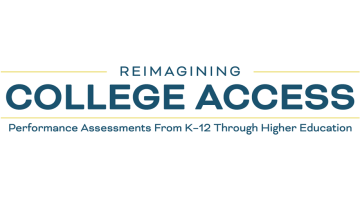Breadcrumb
RCA Newsletter: April 2022

The Reimagining College Access (RCA) initiative is a national effort to advance the use of high-quality performance assessments completed by secondary students for higher education admission, placement, and advising decisions. The approach is intended to increase college access by expanding and deepening information about secondary students’ preparedness for higher education while deepening high school education by focusing on meaningful and rigorous work. The initiative, led by the Learning Policy Institute in collaboration with EducationCounsel, brings together a diverse group of k–12 and higher education policy and practice leaders engaged in using authentic assessments of students’ competencies and mastery of skills needed for college, work, and life in the 21st century.
This quarterly newsletter provides updates about the work of the RCA initiative, the RCA Network members, and other partners seeking to reimagine college access and success, as well as national trends in college admissions.
Jump to: RCA Publications | RCA In the News | RCA Network Research & Resources
RCA Publications
Building on the momentum of the Annual Convening in November, RCA is finalizing several resources for stakeholders to effectively use performance-based assessment in k–12 teaching and learning and in higher education admission, placement, and advising. Read on for details on one of the forthcoming publications.
“Performance Assessment in College Admissions: Designing an Effective and Equitable Process”
(Forthcoming)
This resource has been developed over the past year with input from higher education admission staff and k–12 performance assessment experts to help higher education institutions effectively integrate performance assessment information in their admissions process. The resource provides guidance on how to design changes to the application that align with the institution’s values and goals for the admission process. Additional 2022 RCA resources and tools are under construction and will be shared at a later time.
RCA In the News
“Connecting the Student: K12 Performance Assessment for College Advising and Placement”
(February 2022 | CCA on the Air podcast)
LPI’s Monica Martinez spoke with Brandon Protas, RCA’s partner at Complete College America (CCA), for an episode of CCA On the Air. Martinez and Protas discussed k–12 performance assessment implementation in college advising and placement processes. They also shared recommendations from a national task force of k–12 and higher education leaders convened by RCA that explored how k–12 performance assessments can be used to inform college advising and placement, with a focus on increasing success for historically marginalized students.
“Collaboratively-Developed, Standards-Based Performance Assessment”
(December 2022 | Colorado Department of Education)
The Colorado Department of Education (CDE), an RCA partner, published findings from a report from the Center for Assessment, Design, Research and Evaluation at the University of Colorado Boulder that studied the department’s implementation of performance assessment. The multi-site case study outlines takeaways from the practices of two high schools that used performance assessment for several years to provide students the opportunity to demonstrate deep content knowledge and to inform their educators on students’ postsecondary and workforce readiness. CDE has partnered with RCA to convene k–12 and higher education systems to support greater statewide use of performance assessment, in part by leveraging Colorado’s high school graduation policy.
RCA Network Research & Resources
New Report Issues Recommendations for Equitable Postsecondary Access
Toward a More Equitable Future for Postsecondary Access (2002), a new report from the National Association for College Admission Counseling (NACAC) and the National Association of Student Financial Aid Administrators, offers recommendations for admission and financial aid practitioners, educational institutions, governmental agencies, and policymakers to advance equity in college admission. The report synthesizes findings from the convening of NACAC’s Commission on Redesigning College Admission and Financial Aid Through a Racial Equity Lens, a national panel of leaders and researchers from across higher education, policy, and civil rights. Their mission is to offer key policy recommendations to address inequities related to the application, financial aid, and admission processes. The report argues for a broad-based, systemic approach to dramatically transform the college admission process and offers a vision of how admission and financial aid systems should be designed if racial equity is the primary objective.
ACT Releases Survey Data on Students’ Engagement in College Preparation Activities
College Preparation Opportunities, the Pandemic, and Student Preparedness: Perspectives From Class of 2021 College-Bound ACT Test-Takers (February 2022), a report from ACT, provides a summary of findings from a new survey on the impact of the pandemic on student participation in college-preparation activities. Data show strong links between participating in college preparation activities and applying to college among the class of 2021. The survey also finds that almost half of the class of 2021 reported that at least one of their college preparation activities was canceled because of the pandemic. In addition to these findings, ACT’s report offers multiple recommendations for improving students’ access to college preparation opportunities, including urging school leaders to ensure that students and families are aware of preparation opportunities, providing personalized supports for specific college preparation-related issues that students are facing, and incorporating “relevant topics” in college preparation activities.
New Report on Multiple Measures Assessment and College Placement
Lessons from Two Experimental Studies of Multiple Measures Assessment (January 2022), a report by MDRC, summarizes two recent experimental studies from MDRC’s Center for the Analysis of Postsecondary Readiness. The report finds that student outcomes improved when colleges used multiple measures assessment, a method in which colleges rely on high school grade point averages (GPA), placement test scores, and other measures to understand student readiness and assign incoming students to developmental or college-level courses in math and English. The studies, which took place at State University of New York community colleges, Minnesota community colleges, and a Wisconsin community college, found that high school cumulative GPA was the best “observable predictor” of success in college-level courses. It also found that students who transitioned from developmental to college-level courses by multiple measures assessment were approximately 10 percentage points more likely to complete college-level courses after three semesters.
